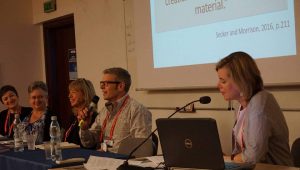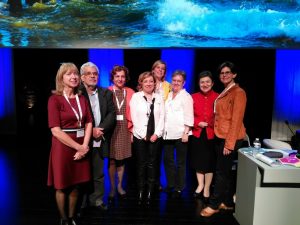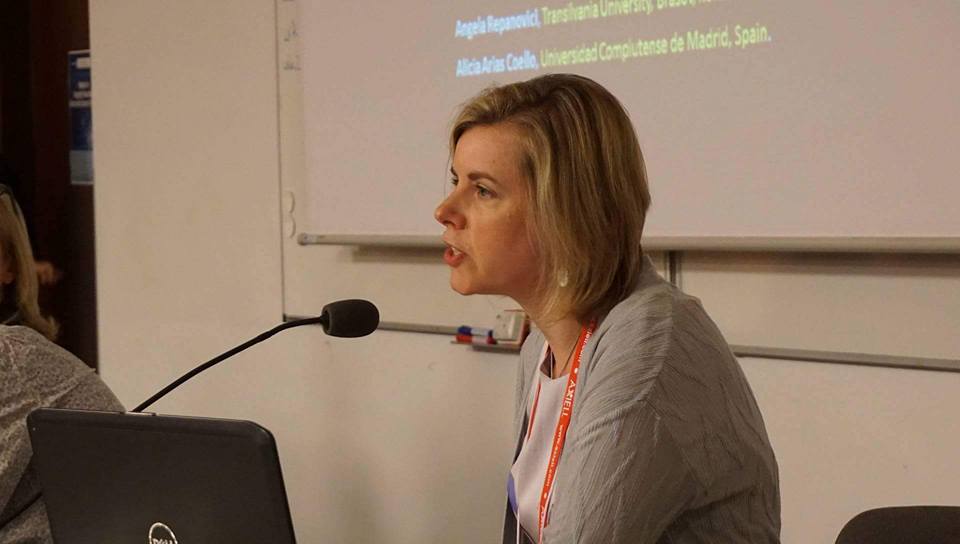I’ve been away to two conferences in the last month presenting about one of my key research interests: copyright education. As some of you may know, I am a former librarian / copyright officer, now transformed into a Senior Lecturer in Educational Developer (yes I do sometimes have an identity crisis!) so the first conference I attended in August was in the World Library and Information Congress which Is the annual conference run by IFLA (which is the International Federation of Library Associations). The event is attended by around 3000 library and information professionals from around the world. This year as part of the conference there was a special one-day event entitled Models for Copyright Education in Information Literacy Programs. The conference was held in Wroclaw in Poland, which is a lovely city and I was unable to resist the temptation of an event that combined my two key research interests, copyright education and information literacy.

I was part of the opening plenary which was an international panel presenting findings from a multi-national survey that has been carried out in 14 countries to examine levels of ‘copyright literacy’ amongst library and information professionals. As copyright education often falls to librarians, this survey has been highly revealing about levels of knowledge and confidence in the sector about copyright, and the similarities and contrasts in countries such as the UK, USA, Turkey, Romania, Sweden and Norway. I ran the survey back in late 2014 with Chris Morrison, Copyright Support and Software Licensing Manager from the University of Kent, and it was completed by over 600 library and information professionals in the UK. We published the survey findings in 2015 in Library and Information Research and a subsequent article came out last month on our qualitative research into librarians’ experiences of copyright in their professional lives.
The panel in Poland included myself, Chris and colleagues from Turkey, Romania, Sweden and Norway. We reflected on why copyright education mattered, why it was so timely to focus on this subject and approaches that were working in different countries around the world. One thing was clear was that the work of organisations such as IFLA who lobby for strong copyright exceptions for libraries and education around the world, are often somewhat removed from the day to day experience of trying to support and advise staff and students about copyright issues. Chris and I spoke about the work we’ve done since the survey in the UK to develop communities of practice, to work with stakeholders from all sides of the table (publishers, collecting management organisations and education) and to develop creative games-based learning approaches to copyright literacy. Some of you at City may have played Copyright the Card Game, when I ran a session with Stephen Penton, City’s Copyright Librarian in August. There will be another opportunity to play the card game later this term (date to be arranged) and also an opportunity to play the new game, The Publishing Trap on 10th November. This is a new game Chris and I have developed focusing on scholarly communication and the impact of publishing choices that academics and researchers make throughout their life. If you are interested in signing up to play the Publishing Trap you can book here!

The international copyright literacy panel was also repeated a few weeks later at the European Conference on Information Literacy (ECIL) held in St Malo in France with representatives from several more countries joining the panel including Hungary, Spain and Bulgaria. ECIL is one of my favourite conferences, given its focus on all forms of information and digital literacy in formal education and beyond. The theme of the conference was information literacy in the workplace and we were delighted to have an entire afternoon strand dedicated to copyright literacy. Not only did I get to present a paper on creative and collaborative approaches to copyright literacy, but I chaired the international panel and the afternoon set of papers where researchers from around the world shared insights into copyright and legal education in their country. I also attended some great presentations on diverse topics, such as the value of digital literacy in the workplace, and using mindfulness and contemplative pedagogy in information literacy teaching. I met up with colleagues who are continuing research into students’ preferences over the formats for academic reading, and experienced three fantastic keynotes from Bonnie Chuek, Drew Whitworth and Stephane Goldstein. ECIL is a fabulous international community and St Malo was a wonderful city to network with old friends and meet some new colleagues too.
I’ve been reflecting on why I feel so passionate about copyright education, and it’s very similar to why I think education more broadly matters. Access to information, knowledge and learning helps people to achieve goals in their personal and professional life. However, access alone is not enough, people need literacies –knowledge, skills and behaviours – to make the best use of information, to interpret and critique knowledge and to become lifelong learners. If, in a very small way, I can help people be the very best they can, whether they are teachers trying to inspire others through their teaching or students studying for their degree, then I feel like my day has been worthwhile. Copyright and licensing is one of those areas where people can get stuck, they might avoid it, ignore it or just think it’s irrelevant. But in fact increasingly it governs the way we all get access to digital resources, so being ‘copyright literate’ is going to be even more important in the future. Copyright literacy help us protect our own creative outputs, and also decide how we want to share them, it ensures we can use other people’s work ethically and legally. In my view these literacies are essential for anyone working in higher education.
I’ve had a great couple of months at conferences but I am really enjoying settling into my role as a lecturer in LEaD, teaching on the MA in Academic Practice. I am continually drawing on my experiences as a librarian, learning technologist and copyright officer and look forward to sharing more of my ideas with colleagues at City. And if you want to play my new game then do sign up for the session on the 10th November as places are limited.

